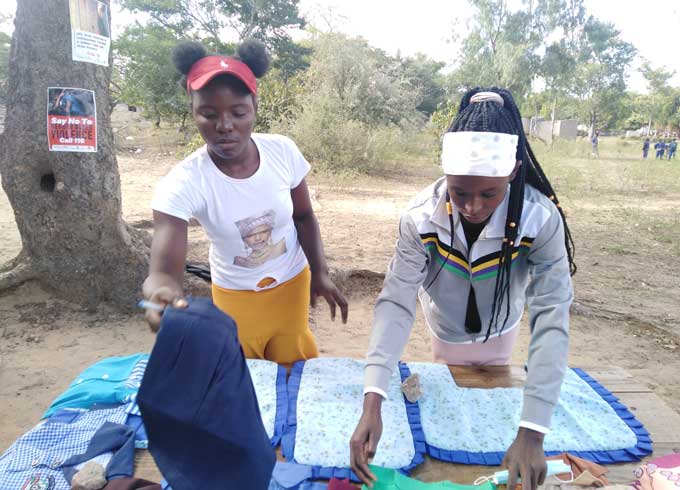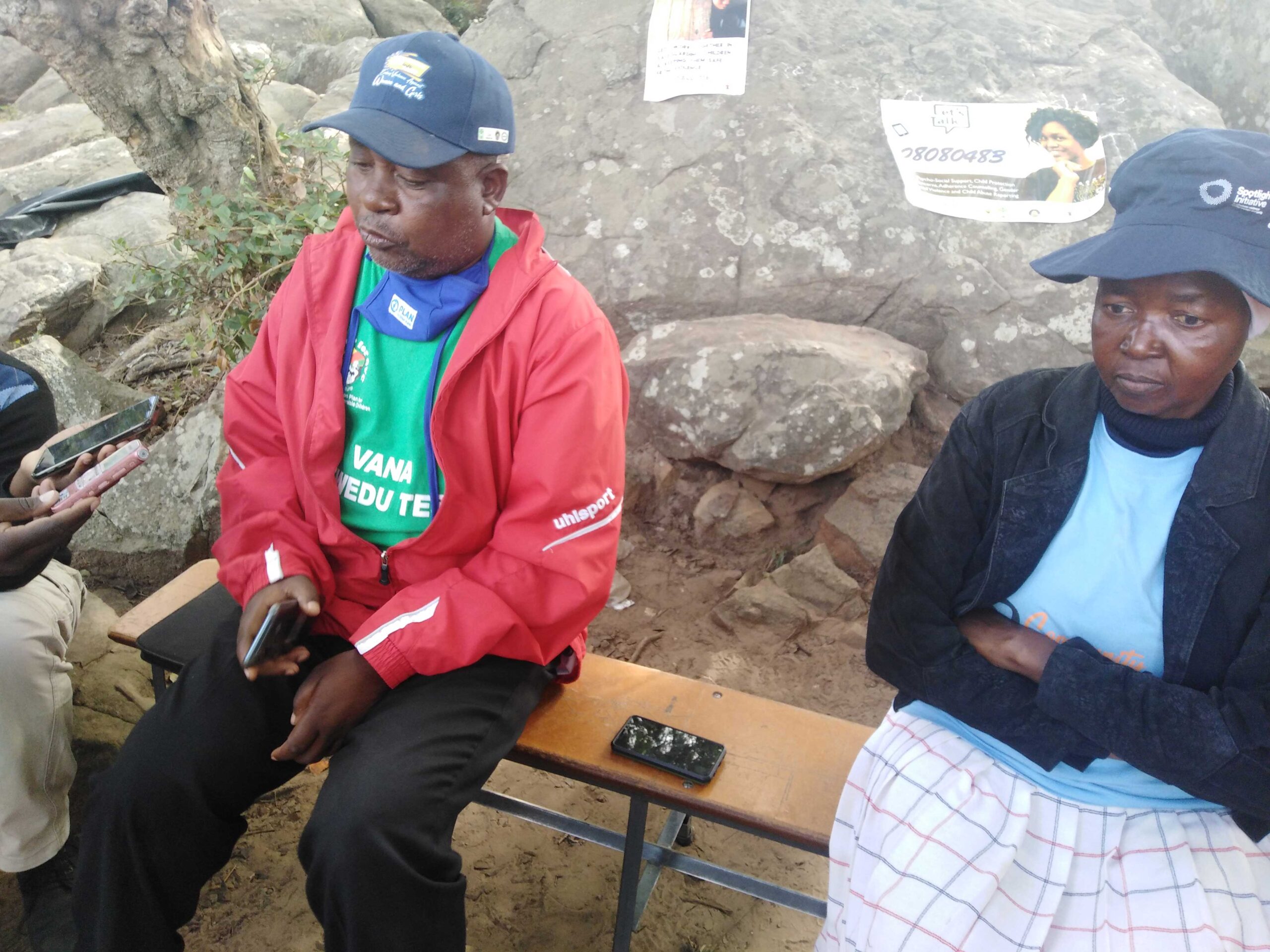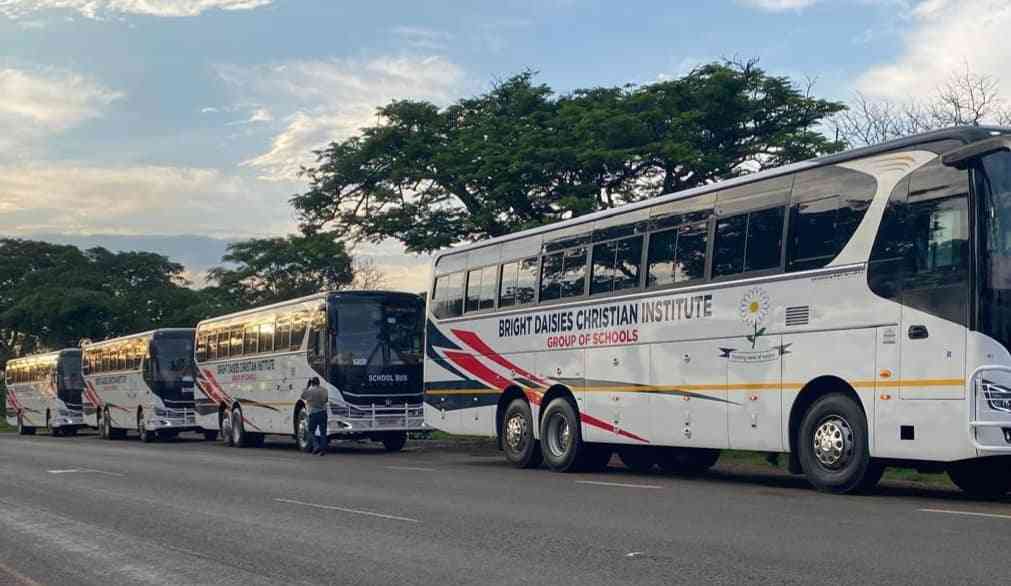
By Moses Mugugunyeki Teenagers Madeline Chijumburu from Mabhiza village and Claudia Khumbula from Chimambo village in Chipinge’s ward 24 have many things in common.
They both dropped out of school while doing Form 3 as their parents could not afford paying their school fees.
Chijumburu (19) despite being among the brightest students in her class, was compelled to drop out of school after her parents failed to raise money to proceed to Form 4. Eighteen-year-old Khumbula, who was raised by her grandmother, chose not to burden the already struggling and only guardian left following the death of her parents.
They are jointly running a thriving sewing business at Checheche growth point.
What’s more fascinating about the duo is that they managed to escape the jaws of child marriage, a practice that is widespread in their area.
According to the Zimbabwe National Statistics Agency (Zimstat), 33.7% of girls aged below 18 are married, which is one in three girls under 18.
Zimbabwe is among the 20 African countries where child marriages are most rife and Chipinge is one of the districts in the country with the highest prevalence.
Chipinge district is riddled with traditional practices and attitudes which perpetuate the discrimination and infringement of women’s fundamental civil liberties.
- Chamisa under fire over US$120K donation
- Mavhunga puts DeMbare into Chibuku quarterfinals
- Pension funds bet on Cabora Bassa oilfields
- Councils defy govt fire tender directive
Keep Reading

Here unequal dominant patriarchal value system is the order of the day.
Zimstat’s 2019 Multiple Indicator Cluster Survey (MICS) found that the highest prevalence of child marriages, 50.9%, is among families whose heads identified their religion as “traditional.”
But girls are fighting back against this harmful tradition.
“When I dropped out of school, a lot of male suitors approached me promising to marry me,” Chijumburu said.
“Fortunately, I was roped in an adolescent empowerment programme and the rest is history.”
Chijumburu said she was part of the DREAMS (Determined, Resilient, Empowered, Aids-free, Mentored and Safe) programme, where among other issues she was empowered with social and economic skills.
“I chose sewing among other training programmes that were offered,” she said.
“I was given a mentor for 30 days and after the training, we were given start-ups and I bought myself a sewing machine.”
Chijumburu is a proud owner of a tailor’s shop at Checheche growth point, a sprouting rural centre in Chipinge, where she sews uniforms for local schools, among other garments.
Khumbula said she missed marriage by a whisker after a friend had linked her to a man working in South Africa.
“I nearly fell into the trap of this Mujonijoni [local lingua franca for Zimbabwean men who work in South Africa],” she said.
“A friend had linked me to this man, but after second thoughts I decided not to.
“They wanted to take advantage of our situation at home, but I refused.”
Khumbula was advised of joining DREAM sessions where she got empowered.
“The programme helped in some way; it really opened my mind towards strengthening myself economically and not to rely on someone else,” she said.
“I am now able to sew clothes and sell in communities.
“Apart from gaining skills, we also learnt on the dangers of HIV and other STIs.”
Khumbula believes if she had not attended the DREAMS programme, she and a myriad of other girls in Chipinge would have got married earlier.
Child case worker Cecilia Bere said she has been working with children of all age groups in a bid to fight child marriages and help reduce HIV.
“I have been working with children of various age groups starting with the young ones under the Stepping Stone programme up to the adolescents,” she said.
“The programmes are meant to fight child marriages, a practice that is rampant here and we also do these programmes to help reduce new HIV infections, especially among adolescent girls and young women.
“We are happy that the community has embraced these training programmes as evidenced by the number of girls coming for the sessions.
Bere said girls learn a lot of things under the DREAMS programme, with the main emphasis being helping them navigate difficult social situations.
“A lot of girls who have gone through this programme are doing well and the mind-set of the community has changed,” she said.
Bere’s counterpart Alsone Mashakwari is elated by the overwhelming support the Chipinge community has shown in fighting child marriages.
“As a community, we are happy with the progress that we have achieved in dealing with this scourge,” Mashakwari said.
“The traditional leadership and community leaders have welcomed this and are working with all and sundry to help deal with this demonic practice.
“We are happy that organisations such as the National Aids Council and its partners have mobilised communities here in Chipinge to fight child marriages simultaneously dealing with HIV and Aids.”
Mashakwari said he was happy that the programmes have also incorporated the boy child.
“In most instances, boys were left out, but you would realise that when they are grown up they are the perpetrators,” he said.
“The Brotha2Brotha programme is doing wonders in our communities and we are seeing boys coming in their numbers to get empowered through edutainment.”
Mashakwari said the DREAMS and many other programmes being implemented in Chipinge were making an enormous impact in many girls’ lives.
“These girls and young women learn a lot of things, including that early marriages are wrong,” he said.
“They are taught that child marriages are wrong in the sense that they breed gender-based violence, something that has been rampant in our society, especially for those, who married under the age of 16.”
He said apart from early marriages, they were also doing sessions on sexual and reproductive health as well as HIV and Aids.
District Aids coordinator for Chipinge London Makwanya said Chipinge was one of the districts in the country characterised by rampant child marriages, which is fuelling new HIV infections.
He said in light of this, NAC working with a number of partners were implementing the DREAMS, among other programmes and paying school fees for vulnerable girls in Chipinge.
“Since 2016 we have realised that HIV incidences have declined here in Chipinge district and this attributed to a number of intervention programmes that we are doing with our partners,” said Makwanya.
“These programmes include DREAMS which among other aims seeks to reduce HIV incidences, especially adolescent girls and young women.
“We know that our district has high child marriage prevalence a key driver of HIV and STIs, but through engagement with traditional leaders, we are seeing this practice fading away.”
Makwanya said the SMART girls and the Brotha2Brotha programmes were complementing the DREAMS programme.
He said both boys and girls learn about sexual and reproductive health and rights, financial literacy, and how to navigate difficult social situations, including coercive relationships.
The programmes also aim to give both boys and girls the confidence and self-esteem to stand up for themselves.










